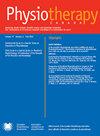“I Had to Know About It, I Had to Find It, I Had to Know How to Access it”: Experiences of Access to Rehabilitation Services Among People Living with Long COVID
IF 0.8
4区 医学
Q4 REHABILITATION
引用次数: 0
Abstract
The aim of this qualitative study is to understand the need for, access to, and quality of rehabilitation services for people living with Long COVID. Little is known about the experiences of people living with Long COVID accessing rehabilitation services. Therefore, we explored health concerns leading people living with Long COVID to seek help to address functional concerns and their experiences with accessing and participating in rehabilitation. Interpretive description guided exploration of participants’ experiences with Long COVID rehabilitation in Alberta, Canada. Semi-structured interviews were completed with 56 participants recruited from: three publicly funded Long COVID clinics, a specialized private physiotherapy clinic, a telephone-based rehabilitation advice line, and a Workers’ Compensation Board-funded Long COVID rehabilitation program. Recruitment through mass media coverage allowed us to include people who did not access rehabilitation services. Data analysis was informed by Braun and Clarke's reflexive thematic analysis. Four themes were identified: (1) the burden of searching for guidance to address challenges with functioning and disability; (2) supportive relationships promote engagement in rehabilitation; (3) conditions for participation in safe rehabilitation; and (4) looking forward – provision of appropriate interventions at the right time. Our findings highlight the experiences of accessing rehabilitation services for people living with Long COVID. Results suggest approaches to Long COVID rehabilitation should be accessible, multi-disciplinary, flexible, and person-centred."我必须知道它,我必须找到它,我必须知道如何获得它":长期慢性病患者获得康复服务的经历
这项定性研究旨在了解长COVID患者对康复服务的需求、获得康复服务的途径以及康复服务的质量。人们对于长COVID患者获得康复服务的经历知之甚少。因此,我们探讨了导致长COVID患者寻求帮助以解决功能问题的健康问题,以及他们获得和参与康复服务的经历。在解释性描述的指导下,我们探究了参与者在加拿大艾伯塔省的长COVID康复经历。我们对 56 名参与者进行了半结构化访谈,这些参与者分别来自三家由政府资助的 Long COVID 诊所、一家专业的私人物理治疗诊所、一条康复咨询热线,以及一个由工人赔偿委员会资助的 Long COVID 康复项目。通过大众媒体报道进行的招募使我们得以将未获得康复服务的人群纳入其中。数据分析参考了 Braun 和 Clarke 的反思性主题分析法。我们确定了四个主题(1) 寻求指导以应对功能和残疾挑战的负担;(2) 促进参与康复的支持性关系;(3) 参与安全康复的条件;以及 (4) 展望未来--在适当的时候提供适当的干预。我们的研究结果强调了长期慢性阻塞性肺病患者获得康复服务的经历。研究结果表明,长COVID康复服务的方法应该是方便、多学科、灵活和以人为本的。
本文章由计算机程序翻译,如有差异,请以英文原文为准。
求助全文
约1分钟内获得全文
求助全文
来源期刊

Physiotherapy Canada
REHABILITATION-
CiteScore
1.90
自引率
20.00%
发文量
93
审稿时长
>12 weeks
期刊介绍:
Physiotherapy Canada is the official, scholarly, refereed journal of the Canadian Physiotherapy Association (CPA), giving direction to excellence in clinical science and reasoning, knowledge translation, therapeutic skills and patient-centred care.
Founded in 1923, Physiotherapy Canada meets the diverse needs of national and international readers and serves as a key repository of inquiries, evidence and advances in the practice of physiotherapy.
Physiotherapy Canada publishes the results of qualitative and quantitative research including systematic reviews, meta analyses, meta syntheses, public/health policy research, clinical practice guidelines, and case reports. Key messages, clinical commentaries, brief reports and book reviews support knowledge translation to clinical practice.
In addition to delivering authoritative, original scientific articles and reports of significant clinical studies, Physiotherapy Canada’s editorials and abstracts are presented in both English and French, expanding the journal’s reach nationally and internationally. Key messages form an integral part of each research article, providing a succinct summary for readers of all levels. This approach also allows readers to quickly get a feel for ‘what is already known’ and ‘what this study adds to’ the subject.
Clinician’s commentaries for key articles assist in bridging research and practice by discussing the article’s impact at the clinical level. The journal also features special themed series which bring readers up to date research supporting evidence-informed practice.
The Canadian Physiotherapy Association (CPA) is the national professional association representing almost 15,000 members distributed throughout all provinces and territories. CPA’s mission is to provide leadership and direction to the physiotherapy profession, foster excellence in practice, education and research, and promote high standards of health in Canada.
 求助内容:
求助内容: 应助结果提醒方式:
应助结果提醒方式:


